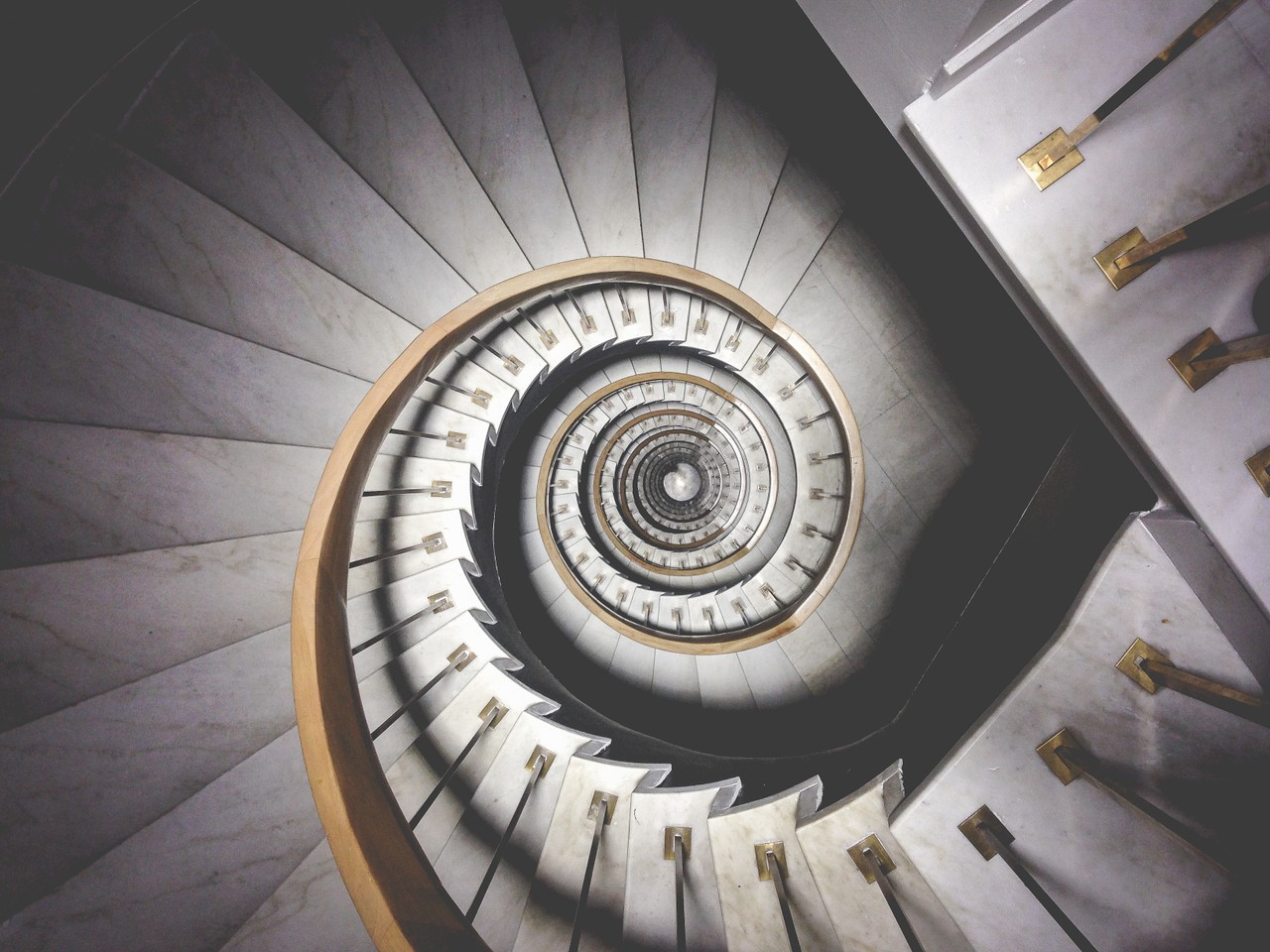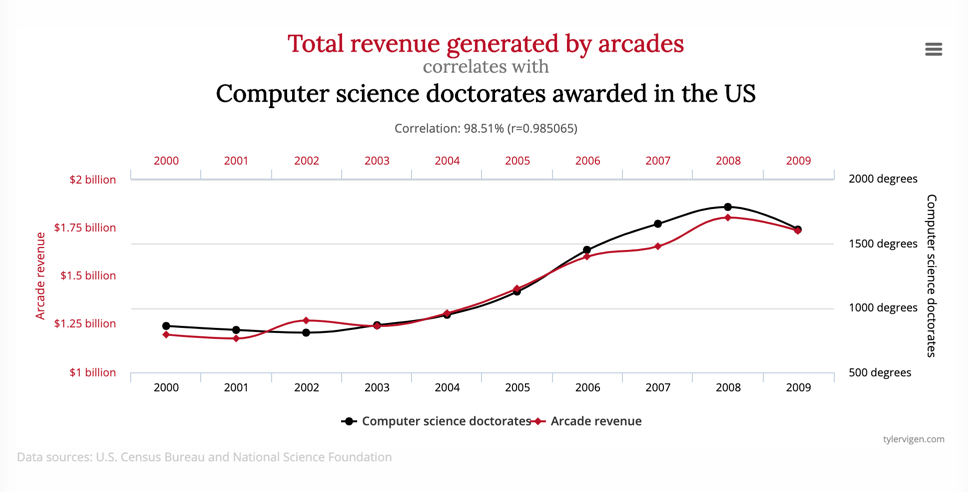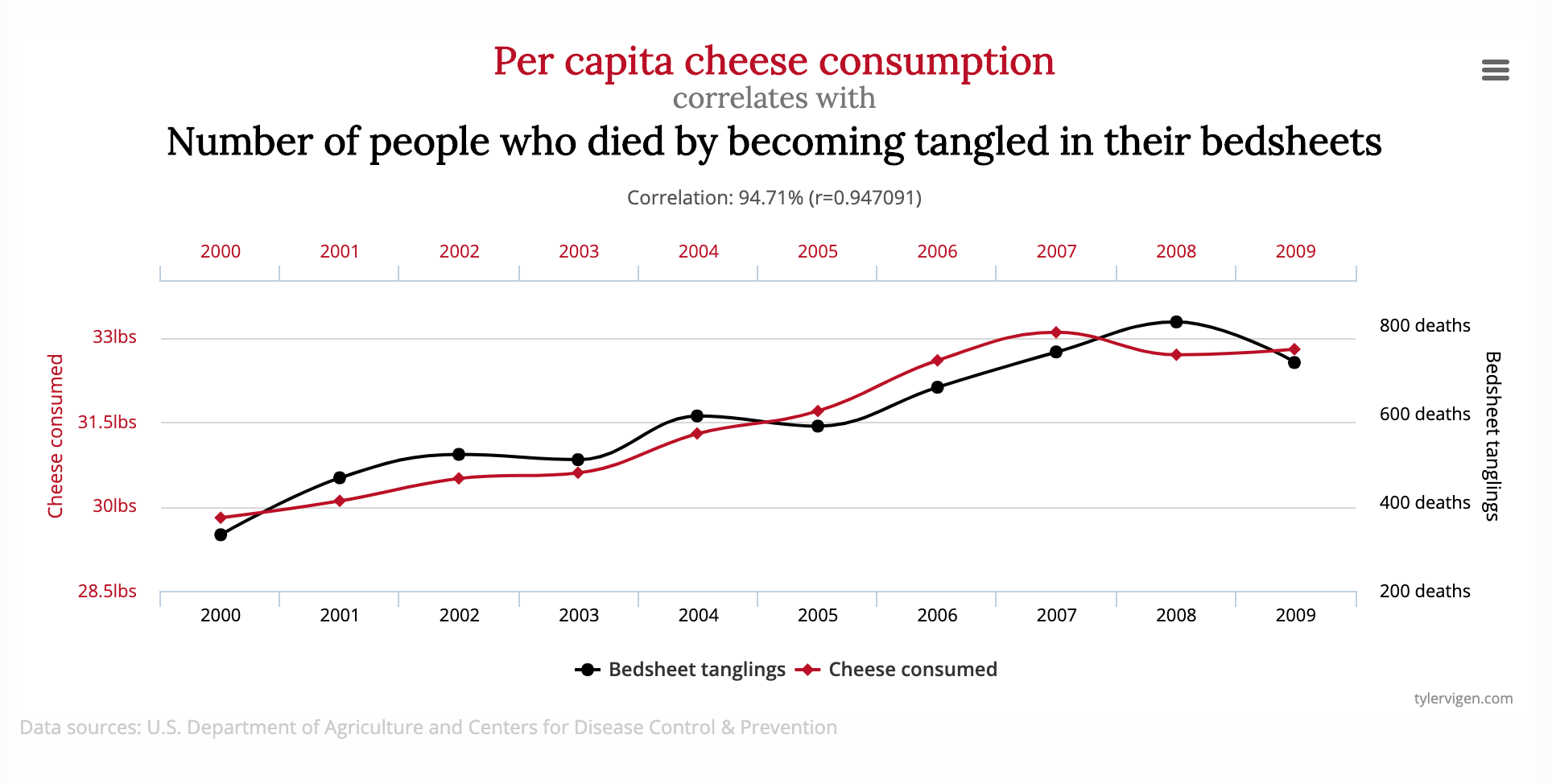What Does It Mean to Sayã¢â‚¬â€¹ "Correlation Does Not Implyã¢â‚¬â€¹ Causation"?

You lot might recall this uncomplicated mantra from your statistics class:
"Correlation does not imply causation."
Then peradventure y'all think you know what this phrase ways.
Similar, if yous studied actually hard in statistics, got a good grade, and then got into college, information technology must hateful that you got into higher because yous aced Statistics course.
While that form, forth with the skills you learned, probably helped, y'all can't ignore the other factors at play - and likely can't argue that your Stats grade was the cause of your acceptance into college.

Outset things starting time - why do we mistake correlation with causation?
It's like shooting fish in a barrel to think that just because two things seem related, that one must exist the cause of the other. But that can be a foolish and sometimes unsafe assumption.
For example, suppose you're trying to effigy out what makes people less grumpy. You perform a study which finds that, when people get at to the lowest degree x hours of sleep a night, they're less grumpy.
But have yous taken all factors into business relationship here? Perhaps they besides started working out more every bit a issue of existence well-rested, and this is what altered their moods.
Not all examples are quite so benign - and some are downright nonsensical.
To illustrate how misleading it can be to assume that correlation implies causation, have a wait at the post-obit graph from Tyler Vigen'due south Spurious Correlations:

While there happens to be a strong correlation between these ii factors, I uncertainty you lot could effectively debate that one acquired the other. Perhaps this will be a challenge for people to try and prove.
Here'southward some other precious stone from Tyler's collection:

Wait at that beautiful correlation. But you'd exist hard pressed to argue that, simply because someone ate more cheese, they'd exist more likely to fatally entangle themselves in their bed sheets.
What is correlation in statistics?
According to the dictionary, a correlation is a common relationship or connection between two or more than things (or variables) - especially one that is not expected on the basis of hazard alone.
Let's use it in a judgement: The huge size of my homegrown tomatoes seems to correlate with the actress rain we had this summer.
Now, here I'm bold that, considering information technology rained a bit more than usual, my love apple plants went nuts and produced monster tomatoes.
Simply is that the only gene? What nearly the nutrient rich compost I used in my raised beds? What nearly the quality of the plants I bought from the nursery? What nearly my careful pruning and disposed?
As y'all can see, although there is correlation betwixt my large tomatoes and our rainy summer, this doesn't necessarily imply causation.
What is causation in statistics?
Fourth dimension for some other definition. Causation, co-ordinate to the dictionary, is the deed or bureau which produces an effect.
Let's get a fleck more than specific. Causation means that at that place is a relationship between 2 events where ane event affects the other. In statistics, when the value of an issue - or variable - goes upwardly or down because of another issue or variable, nosotros can say there was causation. A acquired B to happen.
How about an example for this ane? Perhaps you lot freelance for a mag that pays past the word. The longer the story (and the more words it contains), the more you get paid.
And then there'south a direct correlation between how many words you write and how much you go paid. But at that place's also causation (because you wrote more, you got paid more).
Why is it so easy to get this wrong?
Why is it so easy to think that correlation implies causation? Well, if two things seem related, we tend to acquaintance them and assume they impact each other. When the atmospheric condition'due south cold, people spend more time within. Effectually the holidays, shopping malls are packed. When you take some ibuprofen, your headache goes abroad.
While these circumstances certainly are related - and some might even imply causality - they don't necessarily stand upward to scientific analysis.
There are a few reasons nosotros might mistakenly infer causation from correlation.
What is a Confounding Variable?
First of all, you might take a misreckoning variable in the mix. This is a variable that affects both the independent and dependent variables in your relationship - so confounds your ability to make up one's mind the nature of that relationship.
For example, if a new family moves into a neighborhood, and criminal offense goes up, the residents in that area might assume it's because of that new family. But what if, at the same fourth dimension, a detention heart opened nearby? That'south the more likely cause of the increased crime.
What is Reverse Causation?
Second, you lot might be dealing with contrary causation. This happens when, instead of correctly assuming that A causes B, you go them mixed upwardly and assume that B causes A.
It might be hard to imagine how this happens, but think of how solar panels piece of work. They produce more power when the dominicus is in the sky longer.
But the sun isn't in the sky longer because the panels are producing more than power. The panels are producing more than power because the dominicus shines for longer periods of time.
What is a Coincidence?
Third, we must not forget the power of coincidence. When two things happen to occur at the same time, it's tempting to come across causation. But just like that silly graph above, with the arcades and CS degrees, many are just coincidences.
In the end - why practise we care?
Maybe you're trying to figure out whether a certain new drug makes patients experience better. Or yous'd like to know what makes people buy a certain product.
Whatever your motivation, it's often very useful to figure out whether A causes B, along with how and why.
Only as nosotros've seen, it's not that easy. You've got to control as many factors equally you can, reduce the likelihood of confounding variables and coincidences, and pare down the data to what'south relevant.
We won't become into the deeper philosophical question of how we can really establish causation without a dubiety. That's for another time.
At to the lowest degree now you know that - even though two events or variables may seem related - it doesn't hateful that 1 has a direct causal touch on on the other.
Acquire to code for gratis. freeCodeCamp's open source curriculum has helped more than than 40,000 people go jobs as developers. Become started
Source: https://www.freecodecamp.org/news/why-correlation-does-not-imply-causation-the-meaning-of-this-common-saying-in-statistics/
0 Response to "What Does It Mean to Sayã¢â‚¬â€¹ "Correlation Does Not Implyã¢â‚¬â€¹ Causation"?"
Post a Comment